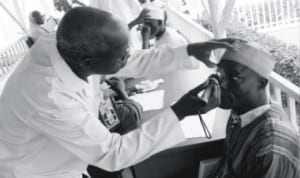Health
NMA Nabs 30 Quack Doctors In Rivers
The Nigerian Medical Association (NMA), has disclosed that it has apprehended 30 quack doctors in Rivers State.
In an interview with The Tide, the chairman, NMA, Dr Ibitrokoemi Korubo, stated that the NMA was determined to rid the state and indeed the nation of quack doctors, adding that anyone apprehended would be prosecuted.
According to him, “the quack doctors we’ve found would be prosecuted, we have 30 quack doctors in 2013 and this is a large number of this number, six have been prosecuted, but a good number have taken to their heels”
We’ve tried hard to fight the issue of quackery, but quacks still exists, we still have along way to go but we will get there,” he continued.
Dr Korubo appealed that the public join with NMA to fight the scourage.
He said patients have a right to insist on seeing the practically licence and NMA identity card of any doctor attending to them to ensure they were dealing with a qualified doctor.
The NMA boss said that doctors have been mandated to display their practicing licences conspicoulsly for the public to sight.
The public must take their destiny in their hands, let me assure you that we will continue the fight, but the public must help us”, he added.
Meanwhile, the Chief Medical Director, Lagos University Teaching Hospital (LUTH), Prof. Akin Osibogun, on Monday appealed to Nigerians to report quack medical practitioners operating in their areas.
Osibogun said in Lagos that quackery and other unwholesome practises should not be allowed to retard the progress so far recorded in the sector.
Osibogun said, “it is illegal for anybody who is not qualified to practise as a medical doctor to do so. “There is a law against it and many states of the federation now have facility registering agencies. “Like in Lagos, they have HEFAMAA (Health Facility Monitoring and Accreditation Agency).
“They (HEFAMAA officials) go round and if they detect any illegal hospital or illegal facilities, they seal off the place and they can prosecute whoever is involved in that practise. “Also, the Dental Council is the monitor for that, but the Dental Council cannot do it alone. “It also requires you and other members of the public to draw the attention of the council to the presence of any unqualified person”, he said.
Osibogun said illegal health operators would expose the citizenry to health hazards such as needless deaths and high mortality rates and noted that apart from the Medical and Dental Council of Nigeria (MDCN), being the regulatory body to accredit and monitor health facilities, some states had set up other agencies.
Osibogun said that precision and utmost professionalism should be the watchword of the private operators in “this critical sector that thrives on protection of human lives’’.

From Left: Assistant Chief Nursing Superintendent, Abubakar Tafawa Balewa Teaching Hospital (Atbuth) in Bauchi, Saleh Sani, examining an eye patient, Malam Umaru Dahiru, during Operation Goodluck Restore Eye Sight at Atbuth in Bauchi last Monday. Photo: NAN
Tonye Nria-Dappa
Health
‘How Micro RNA Research Won Nobel Prize’
Two United States scientists who unraveled the human micro RNA have won the Nobel Prize in Physiology or Medicine 2024.
Victor Ambros and Gary Ruvkun won the coveted prize for their work on microRNA as their discoveries help explain how complex life emerged on earth and how the human body is made up of a wide variety of different tissues.
MicroRNAs influence how genes – the instructions for life – are controlled inside organisms, including humans.
Every cell in the human body contains the same raw genetic information, locked in our DNA.
However, despite starting with the identical genetic information, the cells of the human body are wildly different in form and function.
The electrical impulses of nerve cells are distinct from the rhythmic beating of heart cells. The metabolic powerhouse that is a liver cell is distinct to a kidney cell, which filters urea out of the blood.
The light-sensing abilities of cells in the retina are different in skillset to white blood cells that produce antibodies to fight infection.
So much variety can arise from the same starting material because of gene expression.
The US scientists were the first to discover microRNAs and how they exerted control on how genes are expressed differently in different tissues.
The medicine and physiology prize winners are selected by the Nobel Assembly of Sweden’s Karolinska Institute.
They said: “Their groundbreaking discovery revealed a completely new principle of gene regulation that turned out to be essential for multicellular organisms, including humans.
“It is now known that the human genome codes for over 1,000 microRNAs.”
Health
WHO Begins Regulation On Antibiotic Waste
The World Health Organisation (WHO) has begun acting to curb effects of antibiotic pollution.
The new guidance on wastewater and solid waste management for antibiotic manufacturing sheds light on this important but neglected challenge ahead of the United Nations General Assembly (UNGA) High-Level Meeting on antimicrobial resistance (AMR) taking place on 26 September 2024.
The emergence and spread of AMR caused by antibiotic pollution could undermine the effectiveness of antibiotics globally, including the medicines produced at the manufacturing sites responsible for the pollution.
Despite high antibiotic pollution levels being widely documented, the issue is largely unregulated and quality assurance criteria typically do not address environmental emissions. In addition, once distributed, there is a lack of information provided to consumers on how to dispose of antibiotics when they are not used, for example, when they expire or when a course is finished but there is still antibiotic left over.
“Pharmaceutical waste from antibiotic manufacturing can facilitate the emergence of new drug-resistant bacteria, which can spread globally and threaten our health. Controlling pollution from antibiotic production contributes to keeping these life-saving medicines effective for everyone,” said Dr Yukiko Nakatani, WHO Assistant Director-General for AMR ad interim.
Globally, there is a lack of accessible information on the environmental damage caused by manufacturing of medicines.
“The guidance provides an independent and impartial scientific basis for regulators, procurers, inspectors, and industry themselves to include robust antibiotic pollution control in their standards,” said Dr Maria Neira, Director, Department of Environment, Climate Change and Health, WHO. “Critically, the strong focus on transparency will equip buyers, investors and the general public to make decisions that account for manufacturers’ efforts to control antibiotic pollution.”
Health
Kebbi Harmonises Doctors’ Salaries To Curb Brain Drain
In a concerted effort to curb brain drain, the Kebbi State Government has harmonised medical doctors’ salaries to be at par with their colleagues in the federal government’s tertiary health facilities.
Kebbi State Commissioner for Health, Musa Inusa-Isma’il, disclosed this at the handing over of ambulances to the state-owned health facilities at the Ministry of Health in Birnin Kebbi yesterday.
Inusa Isma’il, according to a statement by Ahmed Idris, the Chief Press Secretary to the governor, said the essence of the harmonisation was to retain the existing medical doctors and attract more to the services of the state.
According to him, the doctors across the state had already started enjoying the new salaries from August 2024.
He said the release of the vehicles was in fulfilment of Governor Nasir Idris’ promise to uplift health care services in the state.
“His Excellency said I should inform you, the beneficiaries of this gesture, that the vehicle should be strictly used for the intended purpose. It should not be used for anything else.
“If there is no referral case, each of the vehicles must be parked at the hospital by 6 pm. The governor said you should warn your drivers against reckless driving as well as violating the instructions.
“We should also do everything possible to reciprocate the gesture by working according to the terms and conditions attached,” he advised.
The benefiting health facilities included Sir Yahaya Memorial Hospital, Birnin Kebbi; State Teaching Hospital, Kalgo; General Hospital, Argungu; General Hospital, Yauri; General Hospital, Zuru; and General Hospital, Bunza.
In his speech, the permanent secretary of the ministry, Dr Shehu Koko, recalled that the ambulances were handed over to the ministry last Friday by the governor for the onward handover to the benefiting hospitals.
He observed that the ambulances would go a long way in improving the referral system in the state, adding that delays in reaching the secondary and tertiary facilities would be eliminated.
The permanent secretary attributed the high rate of maternal mortality in the country to delays in getting to the health facilities for proper medical care.
“We believe with the provision of these ambulances, part of the gaps we have in our referral system will be addressed, whereby patients who require secondary healthcare could be easily transported to secondary and tertiary health centres, where they can get such help,” he said.
In a goodwill message, Commissioner for Information and Culture Alhaji Yakubu Ahmed expressed gratitude to the governor for the support he has given to the ministry to excel.
While advising the beneficiaries to use the vehicles judiciously, the commissioner advised that services and maintenance of the vehicles must be prompt to derive the maximum benefits from the vehicles.
The commissioner also highlighted some achievements recorded by the government in the last year, including beautification of the state capital, completion of a multimillion-naira ultramodern state secretariat, road construction, construction and renovation of classrooms and upgrading of some health facilities, among others.
-
Niger Delta4 days ago
NDDC Boss Thanks God For Transformation … Promises More Infrastructural Projects
-
Business4 days ago
NACCIMA Rep Urges Farmers To Exploit Hybrid Oil Palm Seedlings
-
News4 days ago
4 Professors, 2 SANs Unveil Book On FUBARAISM …Commend Rivers Gov’s Dev Strides
-

 Rivers4 days ago
Rivers4 days agoJulius Berger reiterates commitment to Bodo- Bonny Road Project
-

 News4 days ago
News4 days agoNothing’ll Stop Governance In Rivers, Fubara Assures …Says We Won’t Allow Anyone Take State For A Ride
-
Business4 days ago
Commissioner Blames Aging Infrastructure For TCN Woes
-
News4 days ago
Ikwerre Is Not Part Of Ndigbo, Group Warns
-

 Politics4 days ago
Politics4 days agoNASS Sets Date For 2025 Budget Passage

